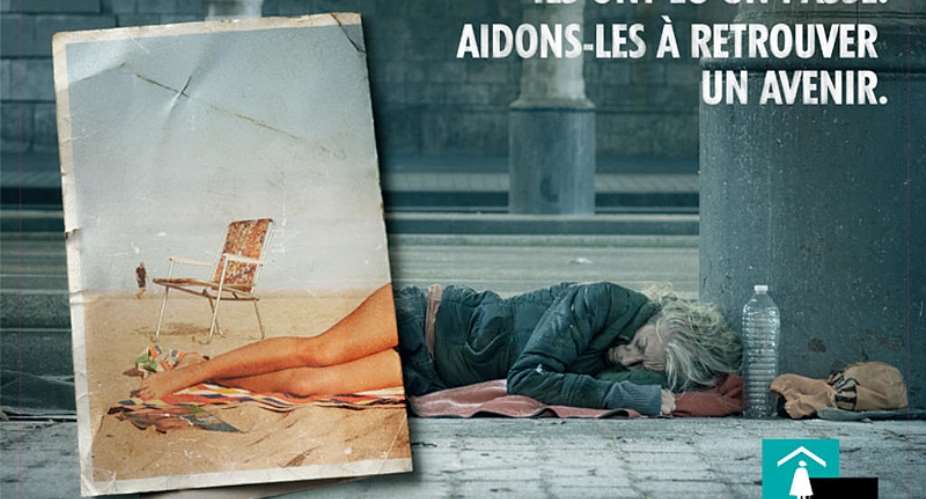A charity has warned that France's homeless population has risen to around 300,000 – double the number in 2012 – and is only likely to increase with the Covid-19 economic crisis.
"The number of homeless people in France is around 300,000. This is terrible. This figure should ring alarm bells," Christophe Robert, the general manager of the charity Fondation Abbé Pierre told the weekly Sunday newspaper, Journal du Dimanche.
He says he fears a new jump in figures on 1 April 2021, which marks the official start of spring evictions. French law prevents landlords from evicting their tenants during the winter months.
According to Abbe Pierre, around 185,000 people are currently staying in shelters, some 100,000 are in temporary housing for people seeking asylum and 16,000 live in slums.
On top of that, there are the people who live in the street all year round, a number which is hard to quantify.
Read more:
Danger of extreme poverty
"We are afraid that a great many of these people will slide into extreme poverty," Robert explains.
During the first Covid-19 lockdown, "there was a great show of solidarity" to help homeless people, he says. But now, the situation has changed with "lots of people being evicted from squats and slums in recent months," he warns.
A report released last week by a collective of charities and NGOs, including Abbé Pierre and Médecins du Monde, showed that between 1 November 2019 and 31 October 2020, at least 1,079 evictions took place in areas considered to be "informal" accommodation, such as squats, camps or slums.
"These repeated evictions simply push people to set up new camps, and the problem doesn't go away," Manon Fillonneau from the Collectif National Droits de l'Homme Romeurope told AFP.
"It just moves the problem without finding a real solution, because all these camps just pop up again in the same places, or right next door."
One of the regions to have experienced the most cases of evictions is Calais and Grand-Synthe, in northern France, where the report says evictions of migrant camps happen on a daily basis.
Nearly 90 percent of the time, the report says, long term accommodation solutions are not found, so people return to the streets.
Missed rent payments
The Fondation Abbé Pierre estimates that due to new parameters and "the economic crisis and mass unemployment, many people will no longer be able to pay their rent".
"More than 9,000 extra emergency accommodation places have been created, but it's an extremely tense situation," said Robert. "The period of legal eviction will begin on 1 April. We really need to prepare in advance for when this situation explodes."
Robert has called for a special public fund of around 200 million euros to be established to help people pay rent and bills.
He also wants "long term solutions for housing", urging the authorities to build 150,000 subsidised apartments.





 Chairman Kingsley Owusu Brobbey calls for Privatization of Electricity
Chairman Kingsley Owusu Brobbey calls for Privatization of Electricity
 Train accident: Four more grabbed and remanded
Train accident: Four more grabbed and remanded
 Gov't to consolidate cash waterfall revenue collection accounts
Gov't to consolidate cash waterfall revenue collection accounts
 Gov't to settle lump sum for retired teachers by April 27
Gov't to settle lump sum for retired teachers by April 27
 Former PPA CEO granted GH₵4million bail
Former PPA CEO granted GH₵4million bail
 Dumsor: The darkness has exposed you; you’ll go down as the worst in Ghana’s his...
Dumsor: The darkness has exposed you; you’ll go down as the worst in Ghana’s his...
 Dumsor: The ‘incompetent’ person provided a timetable whiles those who came to s...
Dumsor: The ‘incompetent’ person provided a timetable whiles those who came to s...
 Defend, ensure NPP’s good works are ‘sold’ and highlight the ‘bad’ state of the ...
Defend, ensure NPP’s good works are ‘sold’ and highlight the ‘bad’ state of the ...
 Bawumia will rank high ahead of Mahama in any anti-corruption test — Salam Musta...
Bawumia will rank high ahead of Mahama in any anti-corruption test — Salam Musta...
 NPP trying to bribe us but we‘ll not trade our integrity on the altar of corrupt...
NPP trying to bribe us but we‘ll not trade our integrity on the altar of corrupt...
